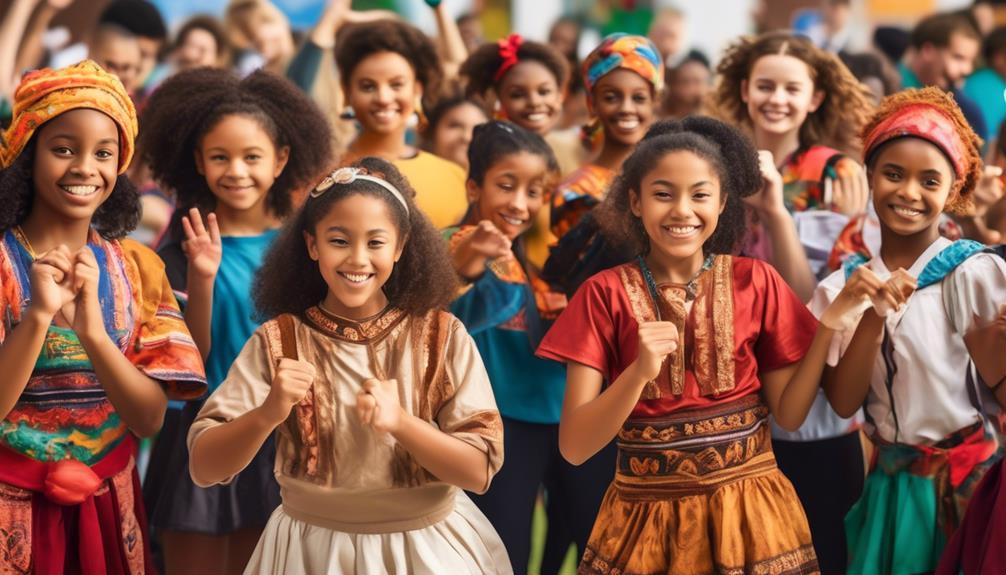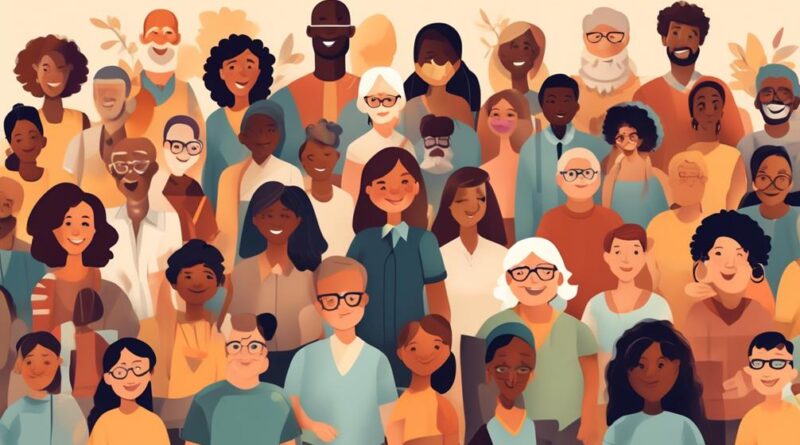Why Is Education Essential for Fostering Community Resilience?
Understanding community resilience requires a multifaceted approach, and education plays a pivotal role in its promotion. From instilling sustainable mindsets to empowering future generations, the impact of education on fostering community resilience is significant.
But how exactly does education accomplish this? The answer lies in the transformative power it holds over individuals and communities, shaping mindsets and behaviors in ways that contribute to a more resilient society.
Understanding Community Resilience
To understand community resilience, you must recognize the interconnectedness of individuals and the collective strength that arises from their mutual support and shared resources. In times of crisis, this interconnectedness becomes crucial for effective crisis response and community support. When individuals come together, they form a network of support that can withstand and respond to various challenges, whether they be natural disasters, economic downturns, or social disruptions.
Community resilience isn't just about the strength of individuals, but also about the strength of the bonds between them. It's about how people come together to support each other, share resources, and collectively respond to crises. This collective response is what sets resilient communities apart – the ability to mobilize resources, provide assistance, and foster a sense of belonging and security for every member.
In understanding community resilience, it's important to acknowledge that it's not just about bouncing back from adversity, but also about growing and thriving in the face of challenges. Resilient communities are able to adapt, innovate, and build on their experiences to become even stronger. This adaptability is rooted in the interconnectedness and support that individuals provide to one another, creating a web of resilience that can withstand even the most trying of circumstances.
Building Sustainable Mindsets
As you consider the interconnectedness and collective strength of individuals in fostering community resilience, it becomes essential to cultivate sustainable mindsets that promote long-term adaptability and growth.
Building sustainable mindsets is crucial for fostering community resilience as it involves nurturing attitudes and perspectives that support sustainable development and critical thinking. Sustainable development is about meeting the needs of the present without compromising the ability of future generations to meet their own needs. By embracing sustainable mindsets, individuals can contribute to the long-term well-being of their communities by making decisions that balance economic, social, and environmental considerations.
Critical thinking is a fundamental component of sustainable mindsets. It involves the ability to analyze situations, consider multiple perspectives, and make informed decisions. When individuals in a community possess strong critical thinking skills, they're better equipped to address complex challenges and adapt to changing circumstances. This fosters resilience by enabling the community to respond effectively to various stressors and uncertainties.
Moreover, sustainable mindsets encourage a proactive approach to problem-solving. Individuals who prioritize sustainable development and critical thinking seek innovative and lasting solutions that benefit the community as a whole. These mindsets also emphasize the importance of continuous learning and adaptation, enabling communities to thrive in the face of adversity.
Promoting Environmental Awareness
Promote environmental awareness by engaging individuals in meaningful discussions and hands-on activities that highlight the importance of sustainable practices. Encouraging environmental stewardship and collective action is crucial for fostering a sense of responsibility towards the planet.
Here are three impactful ways to promote environmental awareness:
- Community Clean-Up Events: Organize and participate in local clean-up events to demonstrate the direct impact of collective action on the environment. By working together to clean up natural spaces, individuals can witness firsthand the positive outcomes of coming together for a common cause. This fosters a sense of environmental stewardship and encourages community activism.
- Educational Workshops and Seminars: Host workshops and seminars focused on ecological mindfulness and sustainable living practices. These events can provide practical tips for reducing waste, conserving energy, and making eco-friendly choices. By engaging in these discussions, individuals can gain a deeper understanding of their role in preserving the environment and feel empowered to take meaningful action.
- Hands-On Gardening and Conservation Projects: Get involved in local gardening or conservation projects that emphasize the importance of biodiversity and sustainable land use. By participating in activities such as tree planting, habitat restoration, or community gardening, individuals can actively contribute to environmental preservation while learning about the interconnectedness of ecosystems.
Encouraging Civic Engagement
Engage individuals in local decision-making processes by participating in community forums and civic initiatives to foster a sense of ownership and responsibility for shaping the future of your neighborhood.
Civic engagement is essential for building a strong and resilient community. By actively participating in local governance and decision-making, you can contribute to the betterment of your neighborhood. Taking on civic responsibility means being actively involved in the issues that affect your community and working towards positive change.
Community involvement is a key aspect of civic engagement. It involves participating in activities that contribute to the well-being of the neighborhood, such as volunteering for local initiatives, joining community organizations, and attending town hall meetings. By engaging with your community, you can gain a deeper understanding of its needs and challenges, and actively work towards finding solutions.
Civic responsibility also extends to promoting inclusivity and diversity within the community. Encouraging open dialogue and understanding among different groups fosters a more cohesive and resilient neighborhood. By actively engaging with individuals from diverse backgrounds, you can help create a more inclusive and supportive environment for everyone.
Ultimately, encouraging civic engagement is about fostering a sense of collective responsibility for the well-being of the community. By actively participating in local decision-making processes and promoting community involvement, you can contribute to building a more resilient and vibrant neighborhood for all its residents.
Fostering Social Cohesion
To build on your contribution to local governance and decision-making, fostering social cohesion within the community is crucial for creating a resilient and supportive environment for all residents. Building relationships and creating unity among community members is essential for promoting a sense of belonging and collective responsibility. Here are some key points to consider:
- Promoting Inclusivity: Encouraging social cohesion means ensuring that everyone in the community feels included and valued. By fostering an environment where diversity is celebrated, individuals from all walks of life can come together and contribute to the betterment of the community.
- Strengthening Community Bonds: Building strong relationships among community members creates a network of support that can be relied upon in times of need. Whether it's through neighborhood events, support groups, or collaborative projects, fostering social cohesion strengthens the fabric of the community.
- Resolving Conflict Constructively: In any community, conflicts may arise. However, by promoting social cohesion, community members can learn to address and resolve conflicts in a constructive manner, leading to greater understanding and harmony.
Developing Problem-Solving Skills
Encourage community members to develop their problem-solving skills by actively engaging in hands-on collaborative activities and real-life scenarios. By participating in these activities, individuals can enhance their critical thinking abilities and learn to devise creative solutions to the challenges they may encounter within the community. Critical thinking is a vital skill that enables individuals to analyze situations, identify underlying issues, and evaluate potential solutions. Through hands-on experiences, community members can sharpen their critical thinking skills, enabling them to make well-informed decisions and address complex problems effectively.
Moreover, engaging in real-life scenarios allows individuals to apply their knowledge in practical situations, fostering the development of creative solutions. Encouraging community members to tackle challenges collectively not only enhances their problem-solving capabilities but also promotes unity and cooperation within the community. When individuals collaborate to solve problems, they bring diverse perspectives and ideas to the table, ultimately leading to more innovative and effective solutions.
Embracing Cultural Diversity

Fostering community resilience begins with actively embracing cultural diversity to promote unity and understanding among community members. Embracing cultural diversity is crucial for building a strong and resilient community. Here's why it's so important:
- Cultural Acceptance: Embracing cultural diversity means accepting and respecting the beliefs, practices, and traditions of all community members, regardless of their cultural background. This fosters a sense of inclusivity and belonging, leading to a more cohesive and resilient community.
- Diversity Appreciation: When community members appreciate the diversity around them, they gain a broader perspective and understanding of the world. This appreciation leads to increased tolerance, empathy, and cooperation, which are essential for navigating challenges and building a resilient community.
- Collaborative Problem-Solving: Embracing cultural diversity encourages collaboration and the sharing of varied perspectives. When individuals from diverse backgrounds come together to solve problems, they bring different insights and approaches to the table, leading to more innovative and effective solutions.
Empowering Future Generations
By empowering future generations with the tools and knowledge they need, we can lay the foundation for a resilient and thriving community. Critical thinking is a key skill that future generations must possess to navigate an increasingly complex and interconnected world. Encouraging young minds to think critically, question assumptions, and analyze information won't only benefit their personal growth but also contribute to the resilience of the community as a whole. By instilling the value of critical thinking in our youth, we can ensure that they approach challenges with a problem-solving mindset, adapt to change more effectively, and contribute innovative ideas to address community issues.
Furthermore, lifelong learning is essential for the continuous development of future generations. Encouraging a thirst for knowledge that extends beyond traditional education ensures that individuals remain adaptable and open to new ideas throughout their lives. By promoting a culture of lifelong learning, we equip young people with the resilience to face unknown future challenges. They'll be better prepared to embrace change, seek out opportunities for growth, and contribute to the overall strength of the community.
Frequently Asked Questions
How Can Education Specifically Address the Mental Health Needs of a Community in Times of Crisis?
You can address mental health needs in a crisis through education by providing trauma-informed support and crisis intervention training. Engage in community outreach to foster resilience and promote mental well-being through education.
What Role Does Education Play in Addressing Systemic Environmental Issues Within a Community?
Education plays a crucial role in promoting environmental awareness and building sustainable practices within a community. By providing knowledge and skills, education empowers individuals to make informed decisions that contribute to addressing systemic environmental issues.
Can Education Help Bridge the Gap Between Different Cultural Groups Within a Community?
Education can bridge cultural gaps, fostering understanding and social cohesion. Through interfaith dialogue and community integration, education nurtures empathy and respect, strengthening ties between different groups and creating a more resilient, unified community.
How Does Education Empower Future Generations to Become Resilient Leaders in Their Communities?
Education empowers you to become resilient leaders by providing knowledge, skills, and values essential for navigating challenges. It fosters community empowerment through informed decision-making and collaborative problem-solving, laying the foundation for a resilient future.
What Strategies Can Education Implement to Promote Civic Engagement and Active Participation in Community Development?
To promote civic engagement and active participation in community development, education can implement service learning and community partnerships. Project-based learning and a focus on social justice can also empower students to contribute to their communities.
Conclusion
In conclusion, education plays a crucial role in fostering community resilience. It does this by promoting sustainable mindsets, environmental awareness, civic engagement, and social cohesion. Education also helps develop problem-solving skills, cultural diversity, and empowers future generations.
Through education, individuals are equipped with the knowledge and skills needed to address challenges, adapt to changes, and build a strong, resilient community.
So, keep learning, advocating for education, and supporting initiatives that promote educational opportunities for all.
